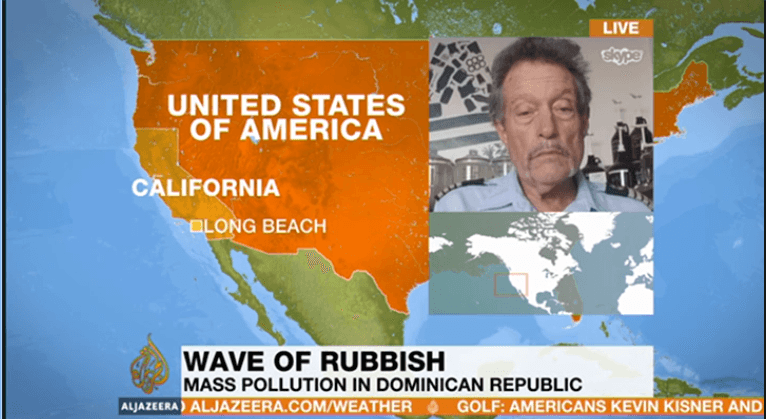Amsterdam, 9 August 2018 – Charles Moore, the Captain who discovered the plastic soup in the Pacific Ocean in 1997, was interviewed by the news broadcaster, Al Jazeera, last month. He summarised the huge problem of plastic and plastic pollution with a few pointed remarks. Plastic threatens the vitality of the oceans’ biospheres and enters our bodies. The particles that we breathe in nowadays consist in part of polymers. Plastic pollution is a worldwide problem but our love of convenience and single-use products are making us lose the war on pollution. Plastic is so ubiquitous to our lives that our rubbish bins are literally and figuratively bursting with it. We will never get the problem of plastic under control if we do not drastically change our consumption patterns and rapidly reduce our dependence on plastic.

Watch here the full interview!
Read the statements of Charles Moore below:
Charles: “We are losing the battle. I predicted this years ago when i discovered the Great Pacific Garbage Patch thou sands of miles offshore. Now it’s invading the biosphere. Just because we are seeing big pieces floating now people are taking notice. But you ‘ve got to understand there’s a bunch of micro plastics and nano-sized plastic as well and that’s invading our bodily tissues. So, this is a worldwide problem and we’ve got to deal with it. It’s not only through eating fish. it is also through breathing our air Dust is now used to be mineral in nature Dust now has a polymeric compound.
Q: Is it too late?
Charles: It is too late to put the genius back in the bottle, but it is not too late to turn around our profligate lifestyles. We’ve got to stop throwing things away. Everything is a resource. Everything can be reused. Everything can be put back into service. It [plastic] has got to be respected. But it also has got to be feared. Plastic gives us a great amount of freedom, but we must not abuse it.
Q: It is not easy to say: you should not use that. Bin it, that plastic water bottle. Bin it, that straw? Bin that one-use coffee cup you get on your way to the office. Is that the solution?
Charles: “If the bins were the size of city blocks. But can not take plastic, it’s volume is so great. All bins are overflowing. Every bin in every city that I visit is overflowing. We’ve got to reduce the amount of plastic that we consume Plastic substitutes for things that were formerly reusable Here in our office we sell reusables and refillables. Things we can use over and over again. We must not constantly throw stuff away in order to make new stuff.
“In essence, we’ve given up on climate change. We are talking about adapting to it now, we are not talking about reversing it. We do not get. To that point with plastic, where we talk about adapting to plastic pollution. We expect the ocean to be half-plastic, half-frozen and current production figures. We must not let that happen. We are not talking about it. And this is something we can stop. capitalist system for decades. Now the externalities are visible and They are absolutely shocking. People can make choices. So yes, the time is now to put it on the front burner. If we do not, we are going to see an awful, horrible. Dante’s Inferno or plastic surrounding our biosphere and living in between landfills.
Q: What does this potentially do to the food chain? Not just our food chain, but the food chain in the oceans? Because fish, mammals, we are designed to process vitamins, fruit, meat, chicken, etcetera. Fish are designed to digest food, they are not made to digest plastic. Is this going to lead to certain species becoming extinct?
Charles: “That is our focus. Myself as a researcher will be a voyage on August 6 to collect the most common in the ocean. The fish you’ve never heard of, the lantern fish. The largest vertebrate on the planet. They are accident prone. They feed on the surface at night. They eat plastic and They are becoming less fit. They are the base of the web in the ocean. if we give them non-nutritive food How many followers actually has toxics in it, we are also using them as a persistent organic pollutants. So we are reducing the fitness of the entire biosphere in the ocean. And we are next. The land is not exempt. The ocean is just the canary in the coalmine. It’s the signal. It’s downhill from everywhere. It is showing us the results first. We are next.”






